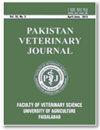家禽孵化场和商品肉鸡肠炎沙门氏菌的分离鉴定
IF 5.4
3区 农林科学
Q1 VETERINARY SCIENCES
引用次数: 12
摘要
接收日期:修订日期:接受日期:在线发布日期:2018年10月4日2018年11月26日2018年12月20日2019年3月7日沙门氏菌是一种严重的病原体,在家禽生产中造成灾难性损失和危险的人类感染。本研究旨在鉴定沙门氏菌血清型,并检测从死鸡胚胎、死鸭胚胎和商品肉鸡中采集的样品中获得的血清型的显著毒力基因和抗微生物耐药性。在一日龄商品蛋鸡中研究了一些血清型(白氏沙门氏菌、肠炎沙门氏菌和鼠伤寒沙门氏菌)的致病性。共收集了180例病例,分离后,肉鸡、死鸡和死鸭胚胎中的沙门氏菌分离株分别为7/100(7%)、5/40(12.5%)和6/40(15%)。最流行的血清型是肠炎沙门氏菌、鼠伤寒沙门氏菌(S.Typhimurium)、普伦沙门氏菌,维勒沙门氏菌和阿姆斯特丹沙门氏菌。毒力基因iroN、cdtB、spaN、invA和orgA的分布模式如下所示;血清型分别为17/18(94.4%)、15/18(83.3%)、14/18(77.7%)、13/18(72.2%)和12/18(66.7%)。此外,sipV、IpfC、sopB、prgH和sitC毒力基因分别在7/18(38.8%)、7/18(38.1%)、5/18(27.7%)和3/18(16.6%)的分离株中扩增。大多数分离株16/18(88.9%)表达的多重耐药(MAR)指数在≥0.3≤1之间。根据致病性测试,Pullorum是最具致病性的,因为其症状明显,死亡率为35%。因此,对家禽中沙门氏菌的基因型特征和耐药性的持续监测是公共卫生关注的问题,以实施针对这种臭名昭著的病原体的有效控制策略。©2018 PVJ。保留所有权利本文章由计算机程序翻译,如有差异,请以英文原文为准。
Characterization of Salmonella Enterica Isolated from Poultry Hatcheries and Commercial Broiler Chickens
Received: Revised: Accepted: Published online: October 04, 2018 November 26, 2018 December 20, 2018 March 07, 2019 Salmonella, is a serious pathogen causing disastrous losses in the poultry production and dangerous human infections. This study was aimed to identify Salmonella serotypes and to detect the prominent virulence genes and antimicrobial resistance of the obtained serotypes from samples collected from dead chicken embryos, dead duck embryos and commercial broilers. The pathogenicity of some serotypes as (Salmonella Pullorum, Salmonella Enteritidis, and Salmonella Typhimurium) was investigated in one-day-old commercial layer chicks. A total of 180 cases were collected, after isolation 18 Salmonella isolates were reported to be as follows 7/100(7%), 5/40(12.5%) and 6/40(15%) in broilers, dead chickens, and dead duck embryos, respectively. The most prevalent serotypes were S. Enteritidis, S. Typhimurium, S. Pullorum, S. Vejle, S. Amsterdam, S. Infantis, S. Petersburg, and S. Atakpame. The distribution patterns of virulence genes iroN, cdtB, spaN, invA, and orgA, expressed as follows; 17/18(94.4%), 15/18(83.3%), 14/18(77.7%), 13/18(72.2%), and 12/18(66.7%) of serotypes, respectively. Added to that, the sipV, IpfC, sopB, prgH, and sitC virulence genes were amplified in 7/18(38.8%), 7/18(38.8%), 7/18(38.8%), 5/18(27.7%) and 3/18(16.6%) of isolates respectively. Most of isolates 16/18 (88.9%) expressed multiple antibiotic resistances (MAR) indices ranged from ≥0.3 ≤1. Based on the pathogenicity testing, S. Pullorum was the most pathogenic due to the clear signs and a mortality rate of 35%. Hence, the genotypic characterization and continuous monitoring of antimicrobial resistance of Salmonella from poultry are of public health concern to implement effective control strategies against this notorious pathogen. ©2018 PVJ. All rights reserved
求助全文
通过发布文献求助,成功后即可免费获取论文全文。
去求助
来源期刊

Pakistan Veterinary Journal
兽医-兽医学
CiteScore
4.20
自引率
13.00%
发文量
0
审稿时长
4-8 weeks
期刊介绍:
The Pakistan Veterinary Journal (Pak Vet J), a quarterly publication, is being published regularly since 1981 by the Faculty of Veterinary Science, University of Agriculture, Faisalabad, Pakistan. It publishes original research manuscripts and review articles on health and diseases of animals including its various aspects like pathology, microbiology, pharmacology, parasitology and its treatment. The “Pak Vet J” (www.pvj.com.pk) is included in Science Citation Index Expended and has got 1.217 impact factor in JCR 2017. Among Veterinary Science Journals of the world (136), “Pak Vet J” has been i) ranked at 75th position and ii) placed Q2 in Quartile in Category. The journal is read, abstracted and indexed internationally.
 求助内容:
求助内容: 应助结果提醒方式:
应助结果提醒方式:


